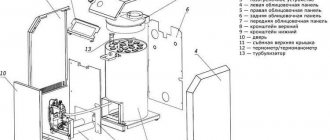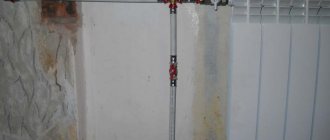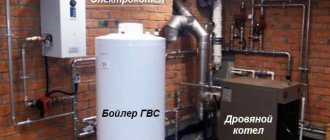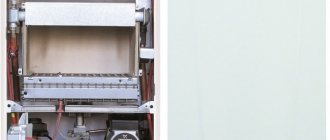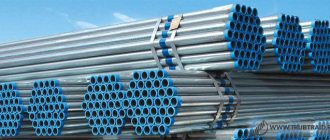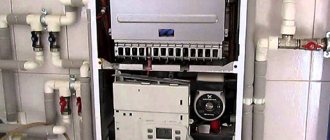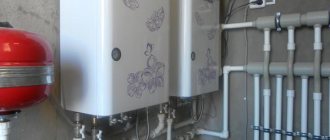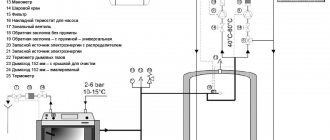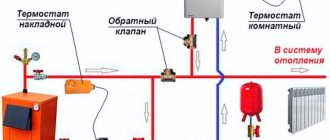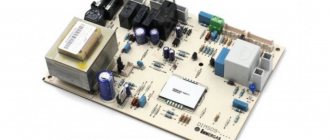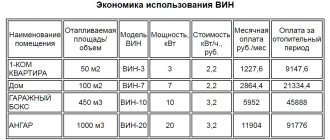Maintainability of the heat exchanger
As noted above, the heat exchangers of modern gas boilers are made of: copper, stainless steel, cast iron. According to reviews, under the right operating conditions, the service life
a steel
heat exchanger in a gas boiler
is 15-20 years, and a cast iron one is up to 30 years. The life of a copper coil is limited to 5-10 years.
In single-circuit heating heat generators, one coil is installed, which transfers the thermal energy obtained from fuel combustion to the coolant. Depending on the design, two-circuit boilers can have two heat exchangers (primary and secondary) or one bithermic.
- In the first option, the primary coil is responsible for heating the coolant and is installed in the upper part of the boiler installation (above the burner). The secondary one is responsible for creating the hot water supply.
- Bithermic has a “tube-in-tube” design. The coolant for the heating system moves in the space between the outer and inner tubes; Water flows through the inner tube of the heat exchanger to provide hot water supply.
Any heat exchanger is susceptible to scale formation. This is especially true for devices through which hard tap water circulates. The separate coil can simply be washed or the damaged section replaced.
In a bimetric heat exchanger, scale forms much faster than its separate counterpart. Deposits that appear in the inner tube of such a device are almost impossible to eliminate. Heat transfer will gradually decrease, which means that in order to maintain the desired water temperature, it will be necessary to increase the volume of fuel burned. Constant operation of the boiler unit in this mode will significantly reduce its service life.
Specifics of gas boilers that do not depend on external energy consumption
A prerequisite for the operation of floor-standing gas heating boilers is the presence of a gas line.
The presence of other sources of energy or electricity is not necessary. Indeed, today, along with improved models (equipped with pumps that circulate water forcibly, automatic control of safe operation, coolant temperature regulators and burner modulation), that is, energy-dependent ones, there are floor-standing gas boilers that are non-volatile. They are purchased in regions where there are power outages.
Features of equipment operating without electricity
These boilers are economical in terms of fuel consumption.
To ensure that the boiler runs only on gas, modern manufacturers have taken two routes. In the first case, they completely simplified the design of the unit. That is, they made it more powerful, but without the automatic and electronic part for controlling the work. With the help of such a device, the home owner can maintain the temperature in the house only at a certain level, that is, there is no automatic adjustment. Modulation of this parameter depending on environmental conditions occurs only after intervention in the operation of the boiler from the outside.
The second way is a heat generator, which is capable of independently generating energy for the operation of the control system. In this case, there is a thermocouple in the gas burner flame. When it warms up, it generates sufficient voltage for the control system to operate above the valve. When the gas supply suddenly stops, the voltage drops and the valve closes.
Important! Since energy-independent boilers do not provide for the presence of circulation sediment, the coolant moves through natural circulation (expansion/compression of the liquid), therefore such heating systems should be organized with a slight slope of the pipes.
What you need to pay special attention to when choosing a gas boiler
With such a variety of different models, it is difficult to make a choice in favor of a specific one. But price should not be the main selection criterion. For effective operation, a modern boiler must meet a number of basic requirements: 1. No Frost system, which prevents freezing of the main components of the boiler, and in an improved form, the general heating system. 2. Improved or universal type of burner - conventional ones are not very economical. 3. Basic equipment should include: 3.1. A membrane-type expansion tank with a volume of at least 7% of the total volume of the heating network. 3.2. Circulation pump. 3.3. A set of sensors for monitoring the temperature of the coolant in the boiler, on the heating radiators, and preferably an air temperature control sensor. 4. Boilers from imported manufacturers must be adapted to the gas and electrical networks of Russia. 4.1. The presence of an automatic spotter on a piezocrystal or electric spark is mandatory. It is advisable to have a heating element with an incandescent element, which will make the operation of the boiler with low-calorie or unrefined fuel more economical and safe. 4.2. Products must be certified. 4.3. The range of operating pressure of gas and water is preferably the widest. 4.4. Built-in overvoltage protection system. Otherwise, you will have to buy and install an expensive filter. The possibility of connecting via a UPS with an output to an external battery is welcome.
Only after all the listed components are available and the requirements are met can the price of devices of comparable power be compared.
Each person chooses the best for himself. Each buyer puts their own meaning into the concept of “best”. Reliability? Safety? Price? Appearance? All this can be correlated with gas boilers. What are the best gas heating boilers? It all depends on what functions are your priority.
Many gas boilers have an automation system, pumps that run on electricity. Such boilers cannot function without a constant supply of electricity. If there are power outages, such devices will not be suitable.
It is necessary to think about what type of boiler is suitable for housing: floor-mounted or wall-mounted. If you need a high-power boiler, then it is best to choose a floor-standing type of equipment. The disadvantage of such a unit is that it requires a separate room. For a regular kitchen, a more compact option is suitable - a wall-mounted boiler.
It is worth considering such characteristics of boilers as the type of combustion chamber. Equipment with an open chamber burns the air in the room. Such boilers require an equipped chimney and a constant flow of air from outside. It should also be taken into account that their body overheats, so a boiler with an open combustion chamber should not be installed next to meters, wooden furniture and curtains. Boilers with a closed chamber have a coaxial pipe in their structure, which absorbs air from the street and exhausts it back. Such a boiler is an economical option, since gas and air are uniformly mixed in the coaxial pipe, so the boiler body with a closed combustion chamber does not overheat.
We recommend: Fiber cement panels: what they are, pros and cons, characteristics, manufacturers, reviews, installation
The modern market presents a choice of gas heating boilers to suit your taste, and which one is better for the buyer to decide. The choice of equipment depends on the needs that are most important to the consumer.
Review of gas boilers
"Prometheus" is a well-known domestic brand of energy-independent floor-standing boilers with a steel heat exchanger. Prometheus models are used to heat large rooms up to 750 square meters. meters. The efficiency is 92%. Micro-torch burner with automatic ignition, plate heat exchanger made of steel ensures efficient and safe operation of the heating system. This company produces not only high-quality models that can successfully heat areas from the size of one apartment to large buildings of various functions, but also affordable ones. Gas boiler "Prometheus" is the optimal combination of quality and price.
Gas boilers Neva is a St. Petersburg brand that specializes in the production of gas boilers and water heaters. The company carefully checks and tests all equipment for performance, electrical safety and tightness. The range of gas boilers is presented in 3 classes, suitable for any wallet: “economy class” (Neva brand), “comfort class” and “premium class” (Neva Lux brand ). Since 2005, the company has been assembling wall-mounted gas boilers from ready-made purchased European kits. Since 2007, it has been manufacturing Neva Lux equipment, which has parts produced by the company itself. All boilers are made in a modern design; consumers can purchase the equipment at an affordable price.
The Korean company Daesung is a leading manufacturer of heating boilers. The company's boilers are economical, have excellent quality and are safe to use. The first heat exchanger is made of copper, therefore it has high efficiency and, accordingly, a long service life. The second heat exchanger is made of steel plates, so there will always be hot water in any quantity and instantly. The boiler is usually used to supply hot water.
is a domestic company whose main focus is the production of automatic gas equipment. Mimax gas heating boilers have a 3 mm thick steel heat exchanger, thanks to which they have excellent heat transfer. When assembling the equipment, heat-resistant materials are used to significantly reduce the temperature of the outer casing to 40 -50 °C. The efficiency of the company's boilers is 87%. The service life of heating equipment is more than 15 years. has developed a series of universal boilers that operate on both gas and solid fuel. Firewood, coal and peat are used as fuel. The average transition time from one fuel to another does not exceed 1 hour.
Gastroy LLC is engaged in the production of gas boilers of the Ochag brand, which successfully sells 40 types of heating boilers. Among them are gas heating boilers, designed to provide heat to small rooms with an area of about 1000 m². All Ochag devices are easy to use, have an excellent level of quality combined with reasonable prices.
The Protherm “Bear” gas boiler has a heat exchanger constructed of several units. This design allows the combustion of fuel to transfer maximum heat to the heating water. Advantages of the heating equipment of the “Bear” series: compact dimensions of the boiler, easy installation, simple control, efficiency is 92%, maximum heat transfer with minimal losses, two-stage regulation.
Both the domestic and European heating equipment markets offer decent models from which you can choose a boiler that suits your needs in terms of functionality and price.
Any heating equipment has its own service life
Therefore, when choosing equipment, we pay attention to the quality of materials, strength and place of production. Every customer wants their heater to work as long as possible
To do this, it is important to understand what the standard service life of gas boilers depends on. On average he works 7–12 years
What factors negatively affect performance and contribute to wear? How to prevent breakdown? This article will help you understand how to properly select and operate a gas boiler to avoid rapid wear and tear.
What affects the service life of a gas boiler
It is believed that the duration of operation of the unit depends on its class. Thus, economy class models last on average from 7 to 12 years. In this case, the device is repaired as necessary. Middle-class models (mid-price category), as manufacturers promise, will work for 10–15 years.
Why does class count? Because cheap devices use lower quality materials, mechanical controls, and often do not have a display. They are not as efficient in operation and do not come with the latest features.
Boilers of the middle and highest price categories are equipped with components made of high-quality materials. They have built-in sensors, automation, self-diagnosis and useful functionality. Electronic controls and a display make use comfortable. But at the same time, the price of these devices is often “inflated” by the name of the manufacturer.
For example, such well-known brands as “Ariston”, “Bosch”, “Vailant” are much more expensive than less well-known ones. Dishonest companies take advantage of this and use lower quality Chinese components instead of expensive ones. As a result, you overpay, and the service life of a premium boiler is the same as in the economy segment.
What factors should be considered
In addition to the class and price segment, other aspects also influence the lifespan of gas equipment.
Heat exchanger material
Why does a wall-mounted unit have a shorter lifespan than a floor-standing unit? Perhaps the type of placement matters? No, floor-standing units are simply equipped with cast iron or steel heat exchangers. Over the same period of operation, their wear rate is significantly lower than that of copper radiators that are installed in wall-mounted boilers.
Copper is thinner than steel, and during operation it is susceptible to oxidation and corrosion. The gaps in the heat exchanger can be soldered, but the unit will not last long. The average term of work is from 5 to 10 years maximum. Practice shows that copper radiators last no more than 7 years, after which they must be repaired or replaced. They are more sensitive to the quality of tap water.
The type of heat exchanger also matters. A regular coil can be descaled yourself, and the boiler will continue to operate. Bithermal radiators cannot be cleaned, and replacing a unit is almost equal to the cost of a new device.
Burner type
Gas appliances have two types of burners:
- Atmospheric - they take air from the room to maintain the flame. Combustion products are removed naturally using draft.
- Supercharged or forced (turbocharged chambers) - clean air is taken from the street through a coaxial chimney. The flame power can be adjusted, the smoke is removed by a fan.
What does the operating time have to do with it? Forced removal of combustion products is more efficient. The boiler works with greater efficiency, which increases efficiency and reduces the load on its units.
In devices with an atmospheric combustion chamber, a lot of soot accumulates in the holes and on the elements. As a result, the equipment spends more power to maintain operation and heating temperature, so the components fail faster.
Electronics and automation
Electronic models are equipped with control sensors, self-diagnosis and require a network connection. Network instability and power surges lead to damage to elements. We recommend installing a voltage stabilizer.
Features of operation
The service life of heating equipment initially depends on the correct choice. To do this, it is necessary to select a boiler taking into account the characteristics of the room in which it will operate and the planned peak loads. It is recommended to choose a boiler with a power reserve of 15–20%.
Choose a room for installing equipment in accordance with the regulations. It shouldn't be humid inside. Corrosion quickly destroys the heat exchanger, so install an air vent to bleed excess air.
Pressure also affects the lifespan of the unit. To ensure stable performance, connect it to an expansion tank.
- Devices with steel and cast iron radiators have the longest service life.
- Devices with a forced-air burner are more efficient.
- With a voltage stabilizer, equipment will last longer.
How many years the boiler will operate does not depend on the manufacturer’s forecasts. Its maintainability is of great importance. Therefore, it is better to choose so that, if necessary, it is easier to find service centers and spare parts.
Powered by gas fuel, it is available to customers in a wide range. Modern models have many differences from each other, both in design and functionality. Regularly improving the level of technical characteristics of such units allows the introduction of new technological solutions, as well as the use of materials with improved performance characteristics. This is confirmed by domestically produced industrial gas boilers. Russian enterprises produce high-quality equipment in this segment, focusing not only on the experience of foreign colleagues, but also on their own developments. It is worth noting the economic attractiveness of mass production. Two factors contribute to this. Firstly, the payback of products, which are not cheap. Secondly, the demand for high-quality and efficient units.
Modern manufacturer of gas boilers Protherm. What are its advantages
The products of Protherm (Slovakia) are popular in the domestic market for a reason. All this has been achieved thanks to the high performance characteristics of the equipment, its reliability and durability.
A wide range of floor-standing equipment, a variety of models both in terms of pricing policy and configuration, a huge number of service centers - all this has had a positive impact on the demand for this company’s equipment.
Protherm product range
Today the following lines of gas boilers produced by this company are available for sale:
- bear PLO are floor-standing models with piezo ignition. They are volatile, that is, they have an electronic control system over their work;
- bear KLMO - these models have electric ignition and operate autonomously, that is, without human control, as they are equipped with power modulation;
- the KLZ bear is a floor-standing unit, it has two circuits, therefore, in addition to heating the room, it is also designed for preparing hot water;
- bear TLO - floor-standing boilers with an electronic operating control system are designed for heating small areas, as they have a power of 44.5 kW;
- grizzly KLO - a floor-standing unit, in addition to heating large (up to 1.5 thousand sq. m.) areas, will prepare hot water for home and office.
Heating for houses and apartments inevitably involves material costs. Consumers know that the price range for gas boilers, installation and service assistance is quite high. For this reason, many strive to minimize the costs of purchasing, installing and operating boiler systems.
Electronic components and power supply
Today, all models of gas heating equipment present on the domestic market are equipped with automation, which can be non-volatile or require connection from a household AC network. One of the factors that leads to breakdowns and reduced service life of gas boilers is the unstable operation of electrical networks. A normal power surge can easily damage the elements of the control unit, controller, ignition system, gas valve, and other electronic and electrically controlled components.
Advice: If you want the lifespan of your boiler system not to be lower than that declared by the manufacturer, then choose models with a built-in voltage stabilizer or use an uninterruptible power supply in the device’s power supply circuit.
List of works
To understand what exactly should be cleaned, checked and adjusted in the boiler, and with what frequency, just look at the instructions and technical documentation, which must be included with the boiler when purchasing it. These documents contain a complete list of components and elements involved in the equipment, maintenance requirements and the frequency with which the condition should be checked, service performed and settings updated if necessary.
You absolutely cannot rely on this information to clean a gas boiler yourself. This information gives a clear idea of what to expect from the service company with which you are about to enter into a contract for servicing gas equipment.
The works are divided into three groups:
- Regular work carried out before and after the start of the heating season, preparing the boiler for summer inactivity.
- Major maintenance. Work carried out every few years and aimed at servicing elements with an initially intended long service life (flushing the heat exchanger, replacing seals and valves, maintenance of fans, etc.).
- Repair in case of breakdown. The procedure for actions and mandatory work in the event of an emergency situation, breakdown or consequences of external factors.
Seasonal service regulations
Before the start of the heating season, the boiler should be brought into proper working order and the operation of the sensors responsible for safety should be checked. Only after this the boiler is turned on for operation.
If the manufacturer allows routine maintenance to be carried out only once a year before start-up, then in addition to commissioning work, the main elements of the boiler are cleaned, with the exception of flushing the heat exchanger and a complete overhaul of the control units. If maintenance (maintenance) is carried out after the season, then cleaning is reserved for this stage.
Required list of works:
- General inspection, removal of dirt from internal and external surfaces.
- Cleaning filters (air, gas, coarse water filters).
- Cleaning and checking the burner.
- Cleaning the fire section of the combustion chamber.
- Checking the tightness of internal gas channels.
- Checking the ignition electrodes (piezoelectric element and burner).
- Test and diagnostics of the electronic control unit.
- Test and diagnostics of sensors and automation responsible for safety.
- Adjustment of boiler parameters, combustion settings. The process is accompanied by analysis of exhaust gases. Based on the composition and concentration, the master judges the accuracy of the boiler settings.
- Checking the condition of the shut-off valve.
- Checking the supply gas pipeline in the area from the main line to the gas equipment.
- Checking and adjusting the pressure in the expansion tank.
Major renovation
In addition to routine maintenance carried out every season, during a major overhaul of a gas boiler, elements with a limited warranty period are replaced, the internal surface of the heat exchanger, seals and valves are cleaned. The main task is to replace elements that are not subject to maintenance during routine maintenance, but still have a service life.
In case of breakdown
In an emergency situation when a breakdown occurs during operation, it is very important to respond to the problem as soon as possible and return the boiler to working condition. If breakdowns occur, they occur only during the heating season, for example, if the boiler operates for a long time at maximum power during the coldest period of the year.
At this time, it is extremely difficult to find a specialist for quick repairs, but with a service agreement, all you need to do is leave a request so that the repair team can arrive in a short time to fix the problem. Since the service center keeps records of boilers, a specialist arrives at the customer with a set of necessary tools and spare parts for a specific model of gas boiler.
What factors should be considered
In addition to the class and price segment, other aspects also influence the lifespan of gas equipment.
Heat exchanger material
Why does a wall-mounted unit have a shorter lifespan than a floor-standing unit? Perhaps the type of placement matters? No, floor-standing units are simply equipped with cast iron or steel heat exchangers. Over the same period of operation, their wear rate is significantly lower than that of copper radiators that are installed in wall-mounted boilers.
Copper is thinner than steel, and during operation it is susceptible to oxidation and corrosion. The gaps in the heat exchanger can be soldered, but the unit will not last long. The average term of work is from 5 to 10 years maximum. Practice shows that copper radiators last no more than 7 years, after which they must be repaired or replaced. They are more sensitive to the quality of tap water.
The type of heat exchanger also matters. A regular coil can be descaled yourself, and the boiler will continue to operate. Bithermal radiators cannot be cleaned, and replacing a unit is almost equal to the cost of a new device.
Burner type
Gas appliances have two types of burners:
- Atmospheric - they take air from the room to maintain the flame. Combustion products are removed naturally using draft.
- Supercharged or forced (turbocharged chambers) - clean air is taken from the street through a coaxial chimney. The flame power can be adjusted, the smoke is removed by a fan.
What does the operating time have to do with it? Forced removal of combustion products is more efficient. The boiler works with greater efficiency, which increases efficiency and reduces the load on its units.
In devices with an atmospheric combustion chamber, a lot of soot accumulates in the holes and on the elements. As a result, the equipment spends more power to maintain operation and heating temperature, so the components fail faster.
Electronics and automation
Electronic models are equipped with control sensors, self-diagnosis and require a network connection. Network instability and power surges lead to damage to elements. We recommend installing a voltage stabilizer.
Features of operation
The service life of heating equipment initially depends on the correct choice. To do this, it is necessary to select a boiler taking into account the characteristics of the room in which it will operate and the planned peak loads. It is recommended to choose a boiler with a power reserve of 15–20%.
Choose a room for installing equipment in accordance with the regulations. It shouldn't be humid inside. Corrosion quickly destroys the heat exchanger, so install an air vent to bleed excess air.
Pressure also affects the lifespan of the unit. To ensure stable performance, connect it to an expansion tank.
- Devices with steel and cast iron radiators have the longest service life.
- Devices with a forced-air burner are more efficient.
- With a voltage stabilizer, equipment will last longer.
How many years the boiler will operate does not depend on the manufacturer’s forecasts. Its maintainability is of great importance. Therefore, it is better to choose so that, if necessary, it is easier to find service centers and spare parts.
When it comes to the economical use of equipment, it is important to take into account the service life of the gas boiler, because the more often it is changed, the more expensive the final operation of the entire system will cost. The modern market for such units can offer many options for different designs.
All of them are effective under certain conditions. At the same time, in order to identify the most economical gas boiler for specific circumstances, you will need to familiarize yourself with their diversity.
What determines the service life?
The service life of any gas boiler is traditionally influenced by a number of factors. Which it is advisable to take into account before purchasing equipment.
Let's take a closer look at the main points that affect durability:
- Type of gas boiler.
- Type of gas burner.
- Efficiency and functionality of electronics.
- Price category.
- Terms of Use.
- Incorrect commissioning.
- Poor quality installation of heating systems.
- Wrong choice of boilers.
In addition, each point contains a lot of significant nuances that should be dealt with in detail.
Gas boilers are always affected by a large number of negative factors that can significantly reduce their service life. Whether this will become a reality or not depends only on the owner of the equipment
Factor #1 - heat exchanger material
Modern gas boilers are wall-mounted or floor-mounted . The first ones are compact and lightweight, so they are convenient to use in limited space. The second category of equipment is massive and large.
The features listed above are not just boiler characteristics, but factors that directly affect service life.
The reason is that developers are achieving lightness and compactness of mounted boilers by reducing the weight and dimensions of such an important design element as heat exchangers . As a result, the walls of the bodies of mounted models are thinner and prone to overheating, have less resistance to corrosion, and do not cope effectively with loads due to changes in coolant pressure.
In order for gas equipment to serve for a long time, the necessary installation and maintenance work must be carried out by specialists. This will reduce the likelihood of errors, and therefore extend the life of the boiler.
In addition, different materials are used for the manufacture of heat exchangers for both types of equipment. copper is most often used for mounted boilers - as the lightest metal of all suitable for these purposes.
And this is the only advantage, because the performance characteristics of this material are close to mediocre. As evidenced by its tendency to oxidize and not the best protective qualities against pressure changes and their consequences.
Quite often, floor-standing boilers (less often wall-mounted) are equipped with stainless steel . But even with the same manufacturing material, the reliability of the design is not always the same - the walls of heat exchangers of ground-based products are usually much thicker, which extends the service life.
The most reliable metal used for the manufacture of heat exchangers is cast iron . It is resistant to corrosion, and if it is protected from significant pressure drops in the heating system and the resulting water hammer, then this metal will provide the longest service life to heating boilers.
When using a boiler, a significant amount of combustion products is always deposited on the surface of its heat exchanger, which must be removed. Otherwise, they can lead to overheating and breakdowns. And replacing this unit will not always be rational. For example, the cost of a bithermic heat exchanger can be an impressive 50% of the price of the entire gas boiler
The listed features lead to the fact that the difference in service life can be impressive.
Factor #2 - type of gas burner
In domestic boiler installations, two types of burners are used: atmospheric and inflatable. Atmospheric, which are installed in units with natural flue exhaust in open fireboxes. These burners take combustion air directly from the room in which they are located.
Such a smoke exhaust system is structurally very complex, its operation is not stable and depends on many factors, for example, on the speed of the wind, which can clog the smoke exit from the chimney.
The poor quality of the chimney exhaust leads to the accumulation of soot in it, which further reduces the speed of the flue gases and violates the design temperature regime of the boiler, leading to premature burnout of its structural elements.
Inflatable or turbocharged burners are installed in modern closed-type devices with a coaxial chimney and do not have these disadvantages.
The speed of movement in the unit is set by a fan, air is taken from outside the room through the outer channel of the coaxial pipe, and flue gases are emitted into the atmosphere through the inner channel.
The operation of such a fan can be modulated to suit different boiler outputs from 30 to 100%, which significantly extends the service life.
Factor #3 - Electronic functionality
Today, the service life of modern gas boilers used in heating systems directly depends on their automation.
Because electronics performs the following functions:
- selects optimal operating modes, which reduces operating hours and loads;
- performs self-diagnosis;
- prevents emergency situations that often become causes of breakdowns (for example, overheating);
- protects circulation pumps from blocking.
We recommend: How to check the solenoid valve of a gas boiler
Automation of a gas boiler allows you to perform a number of other important tasks. Which, ultimately, extends the service life, preventing breakdowns.
The more advanced the electronics, the more functions it performs. And the likelihood of errors and failures leading to negative consequences is lower.
Factor #4 - boiler price and brand
In the field of gas heating equipment, there is a well-known rule - cheap cannot be good . Therefore, it is more likely that products from well-known European and Japanese brands will withstand many years of operation without breakdowns.
Chimneys must be checked annually, before the start of the heating season. But many owners, as well as inspectors, approach this requirement formally. The result of inaction can be seen in the photo, which shows a chimney pipe almost completely clogged
The reason is that the products of these manufacturers are designed to meet the stringent requirements of domestic markets. And high-quality materials are used in production. In addition, companies with a good reputation have established quality control , which reduces the number of boilers that do not meet the requirements leaving the factory.
Factor #5 - equipment operating conditions
The quality of the coolant has a significant impact on the service life. So, if the water is hard, highly acidic and contains various impurities and foreign particles, then there is no doubt that in a few years the heat exchanger channels will be clogged with scale or corroded by corrosion. Which will lead to early failure of the heating boiler.
Equally important to ensure longevity is the quantity and quality of air used to burn the gas. We discussed the reasons for this in detail above, in the paragraph “Type of gas burner”.
The main way to extend the service life is regular maintenance of boilers. This procedure requires special skills and tools, so not everyone can do the necessary work on their own. It is advisable to conclude a maintenance agreement with the gas company.
Despite the extra costs (payment for the services of a technician servicing the boiler), you should not save on maintenance, since maintenance can not only extend the service life, but also guarantee the safety of those living in the house
The following points can also lead to premature wear:
- increased humidity in the room where the heating boiler is installed;
- high/low temperatures, their differences.
Moreover, all of these factors actively influence durability, both during operation in cold weather and after the end of the heating season.
Factor #6 - errors during system installation
Low-quality installation of boiler units will lead to the fact that it will not be able to operate at stable conditions. In this case, air can collect inside the heat exchanger, and dust can be deposited on the surfaces of the burner device, which leads to a high level of wear.
A frequent root cause of unit malfunctions is considered to be incorrect installation of batteries and other elements of the heating network:
- If the batteries are installed with a counter-slope, air collects in them, which causes corrosion of the internal heating surfaces, both in the heating network and in the boiler.
- An incorrectly installed air vent will not perform its functions, the coolant will not circulate in the operating hydraulic mode, disrupting the temperature regime of the boiler and overheating the heating surfaces.
- Incorrect slopes in the natural chimney system will contribute to soot deposits in the internal channels, a decrease in the size of their cross-section, a drop in the aerodynamic speed of the flue gases, which will contribute to overheating of the firebox and heat exchanger, as well as the possible release of carbon monoxide into the room.
Factor #7 - wrong choice of boiler
Lack of productivity leads to increased loads on the heat exchanger, burner, pumps, which, in turn, leads to their subsequent wear.
The durability of gas boilers largely depends on their structural reliability. The stock of which can only be provided by well-known manufacturers with a good reputation
An equally problematic issue is excess power. Because of which boilers often turn on/off. And unsteady operating conditions are a direct path to premature wear.
We recommend that you familiarize yourself with the criteria for choosing the best gas boiler.
Factor #8 - Automation
More expensive models of gas boilers are equipped with multifunctional automation, which will not only promptly warn about the condition of the boiler, but will ensure the most efficient operation of the boiler. By preventing emergency situations, automation with the functions of self-diagnosis, prevention of overheating and freezing, gas control, auto-ignition, and protection against blocking of the circulation pump significantly extends the life of the gas boiler.
However, for the correct operation of such automation, a voltage stabilizer and a UPS (uninterruptible power supply) are recommended.
Additional information about the device: information about heat exchangers
Water-tube and fire-tube heat exchangers have their own pros and cons, but are used equally successfully in industrial heating equipment. It is impossible to answer the question of which type of heat exchanger is better. It all depends on the specific case.
For example, a boiler from the manufacturer Ferroli with a power of 8 MW has a coolant pressure of up to 10 bar. The design in this case is fire tube and has three gas passages. The devices of this company have proven themselves to be reliable and efficient units that are used in various enterprises around the world.
But other Italian manufacturers offer for sale steam-generating industrial gas boilers with water-tube heat exchangers, which have high productivity. To increase the efficiency of thermal installations, economizers are used. They are needed so that the device has the ability to extract thermal energy from the exhaust gases. These nodes are additional devices. They are supplied complete with the boiler. Sometimes economizers are built into the unit, as is the case with the Viessmann Vitomax 200HS equipment.
If you look at it, this is another fire tube device, which is located at the end of the duct and lowers the temperature of the flue gases. This makes it possible to achieve an increase in efficiency by 6%, which is good savings despite the impressive volume of fuel consumption.
Steam models
This category of boilers is designed to generate steam. Most plants that use steam in the process require high pressure. Therefore, the performance of such equipment consists of temperature and pressure indicators. For the most part, gas industrial steam boilers are units that, through fire tube structures, generate steam with a productivity of at least 0.25 t/h. Depending on the requirements of the enterprise, you can choose models with higher power. As a rule, the maximum reaches 55 t/h. Pressure indicators, in turn, can be up to 30 bar, and temperature conditions can be up to 300 ºС. Modern models are distinguished by their ability to operate on various types of liquid and gaseous fuels. When choosing, it would not be amiss to take into account additional equipment in the form of deaeration devices, dispensers and bubblers.
What factors should be considered
In addition to the class and price segment, other aspects also influence the lifespan of gas equipment.
Heat exchanger material
Why does a wall-mounted unit have a shorter lifespan than a floor-standing unit? Perhaps the type of placement matters? No, floor-standing units are simply equipped with cast iron or steel heat exchangers. Over the same period of operation, their wear rate is significantly lower than that of copper radiators that are installed in wall-mounted boilers.
Copper is thinner than steel, and during operation it is susceptible to oxidation and corrosion. The gaps in the heat exchanger can be soldered, but the unit will not last long. The average term of work is from 5 to 10 years maximum. Practice shows that copper radiators last no more than 7 years, after which they must be repaired or replaced. They are more sensitive to the quality of tap water.
The type of heat exchanger also matters. A regular coil can be descaled yourself, and the boiler will continue to operate. Bithermal radiators cannot be cleaned, and replacing a unit is almost equal to the cost of a new device.
Burner type
Gas appliances have two types of burners:
- Atmospheric - they take air from the room to maintain the flame. Combustion products are removed naturally using draft.
- Supercharged or forced (turbocharged chambers) - clean air is taken from the street through a coaxial chimney. The flame power can be adjusted, the smoke is removed by a fan.
What does the operating time have to do with it? Forced removal of combustion products is more efficient. The boiler works with greater efficiency, which increases efficiency and reduces the load on its units.
In devices with an atmospheric combustion chamber, a lot of soot accumulates in the holes and on the elements. As a result, the equipment spends more power to maintain operation and heating temperature, so the components fail faster.
Electronics and automation
Electronic models are equipped with control sensors, self-diagnosis and require a network connection. Network instability and power surges lead to damage to elements. We recommend installing a voltage stabilizer.
Features of operation
The service life of heating equipment initially depends on the correct choice. To do this, it is necessary to select a boiler taking into account the characteristics of the room in which it will operate and the planned peak loads. It is recommended to choose a boiler with a power reserve of 15–20%.
Choose a room for installing equipment in accordance with the regulations. It shouldn't be humid inside. Corrosion quickly destroys the heat exchanger, so install an air vent to bleed excess air.
Pressure also affects the lifespan of the unit. To ensure stable performance, include an expansion tank in the piping.
Recommendations for choosing heating equipment:
- Devices with steel and cast iron radiators have the longest service life.
- Devices with a forced-air burner are more efficient.
- With a voltage stabilizer, equipment will last longer.
How many years the boiler will operate does not depend on the manufacturer’s forecasts. Its maintainability is of great importance. Therefore, it is better to choose domestic brands to make it easier to find service centers and spare parts if necessary.
Any equipment has its own service life. Depending on the operating conditions, this period may vary to a greater or lesser extent, but there is always a calculated indicator that is used when choosing.
Intensity of work and nuances of operation
Before purchasing, the necessary calculations regarding the power of the boiler system must be carried out. As a rule, in a design organization, specialists “throw on” 15-20% of the power to reduce the load on the boiler at the time of peak loads. If you choose a boiler unit yourself, then often, in order to save money, you purchase a model whose power “butt-butt” corresponds to the calculated one. Constant operation at maximum load significantly reduces the service life of the gas boiler
, therefore, when purchasing a device, you should ensure a power reserve of at least 20%.
Corrosion can destroy a copper heat exchanger within a few years. To increase its service life, you need to get rid of the presence of air in the heating system, since oxygen is a powerful oxidizing agent. To do this, you should use air vents, regularly identify and bleed air from the radiators through Mayevsky taps. We recommend watching the video.
In it, a specialist talks about the relationship between the service life of the boiler system and corrosion in various types of heating systems.
The service life of the boiler unit is affected by the pressure in the heating and water circuits. The stability of this parameter in the heating system is ensured by proper selection of the volume of the expansion tank. Due to low water pressure, the volume may not be sufficient for continuous operation of the burner. Having reached the required temperature, the burner will periodically turn off, and when the temperature drops, it will turn on. When operating for a long time in this mode, the resource of the device is exhausted much faster, which affects the life of the entire boiler unit.
Replacing a gas boiler in a private house - documents you will need
Boiler maintenance, as well as its installation, is carried out only by specialized employees of government agencies, for example Gorgaz
Gas boiler AOGV and AGV are a responsible and important part of housing, therefore only the relevant authorities have the right to replace them, and then with the knowledge of the authorities
To replace a boiler in a private home, you will need to draw up some documents that will need to be submitted to government authorities so that the new device can be legalized. This procedure must be followed so that there are no problems with the relevant authorities later. The owner will be able to collect all the documents independently or seek help from a special specialized organization.
Required documents:
- Certificate that meets all safety standards;
- DVK inspection report;
- Technical data sheet and instructions for the boiler;
- A contract that will provide a service guarantee for 1 year;
- The project and the changes made to it.
Having all these documents in hand, you can go to the city gas department for permission. Your project must be approved, and only then proceed to replacing the boiler. While you wait for permission, you can choose a suitable model that will meet all your requirements and ensure uninterrupted heating operation.
Operating rules for hot water boilers
Wall-mounted and floor-mounted boilers are used to install heating systems.
The latter are able to operate on any type of fuel. Before operating the device, it is necessary to perform it strictly on the floor surface; it is better if a separate room is allocated for this. The operating instructions for hot water boilers must also be followed.
The equipment is equipped with all the required automation, so the operation process is simple. When operating the device, human presence may be required only to make certain temperature changes, as well as if it is necessary to turn off the equipment in the event of an emergency.
Modern wall-mounted devices are mounted on the wall surface. Such equipment has compact dimensions, is easy to use, and does not require a separate room.
Without exception, all hot water boilers purchased from a trusted manufacturer have a fairly long service life, are relatively simple and lightweight, are economical and can be installed very quickly.
Boiler brand
Boiler units up to 24 kW in the price group from 40-60 thousand rubles. characterized by the highest service life from 12 to 18 years.
These include modifications from German companies: Vaillant, Viessmann Group and Buderus, Japanese Rinnai, French De Dietrich. Such devices use the best cast iron alloys, and the components are made using the latest innovative technologies.
We recommend: How to use decorative bricks in the corridor - create a unique interior
The standard or manufacturer-declared operating life is calculated from the date of installation and first start-up of the equipment.
